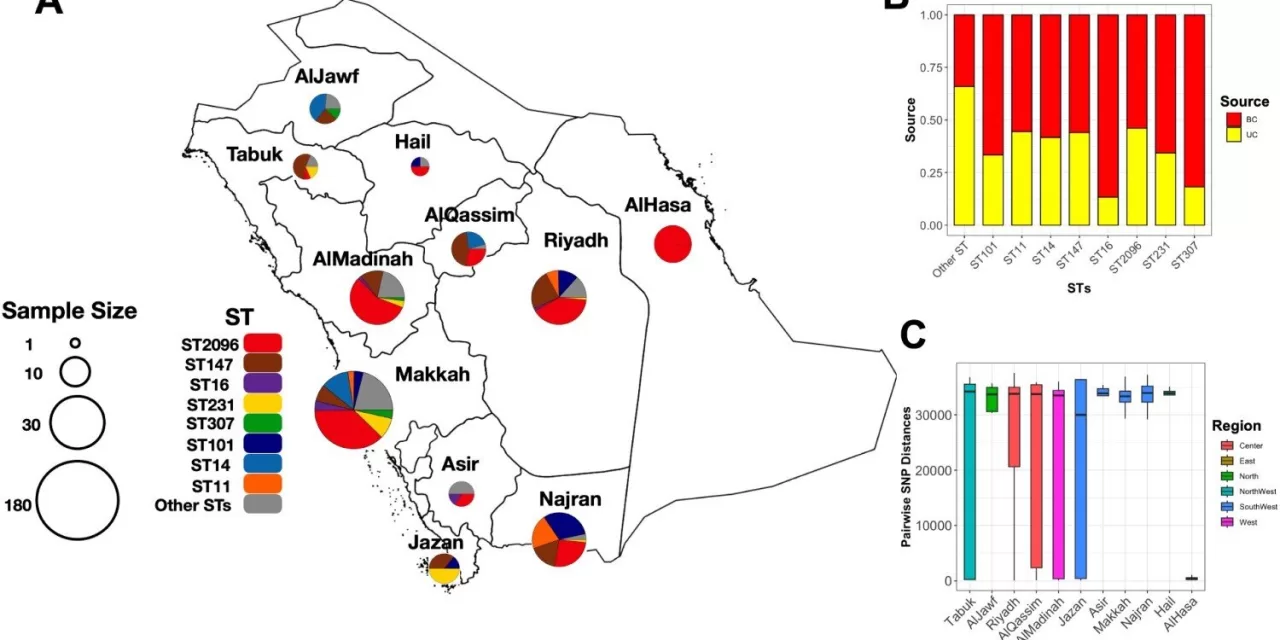Riyadh, Saudi Arabia – A groundbreaking epidemiological study led by King Abdullah University of Science and Technology (KAUST) and the Saudi Ministry of Health (MOH) has uncovered significant regional differences in the behavior and diversity of Klebsiella pneumoniae, a multidrug-resistant bacteria species recognized as a global health priority by the World Health Organization.
The study, published in Emerging Microbes & Infections, represents the largest analysis of Klebsiella pneumoniae conducted in Saudi Arabia. It highlights the unique genetic makeup of the bacteria in the Kingdom, suggesting the need for region-specific health policies to combat its spread and mitigate its impact.
Alarming Threat of Multidrug-Resistant Bacteria
While healthy individuals infected with Klebsiella pneumoniae often experience mild symptoms, vulnerable populations, such as immunocompromised patients, face life-threatening conditions like pneumonia and meningitis. Antibiotics have traditionally been the frontline treatment, but overuse in medicine and agriculture has contributed to the emergence of multidrug-resistant strains.
Assistant Professor Danesh Moradigaravand of KAUST, one of the study’s lead authors, explained, “Klebsiella pneumoniae has a dynamic genome that enables the evolution of pathogenic strains from non-pathogenic ones. Understanding the epidemiology of these strains is crucial for strengthening preventive measures.”
The bacteria’s ability to rapidly exchange genetic material through processes like gene recombination and horizontal gene transfer enables resistance genes to spread between strains, exacerbating the problem.
Regional Insights and Growing Concern
The study analyzed samples from 34 hospitals across 15 cities in Saudi Arabia, using genomic sequencing to investigate the bacteria’s genetic diversity. Researchers discovered that the most prevalent strains in Saudi Arabia closely resemble those found in the Middle East and South Asia, underscoring regional exchange and spread.
Even more concerning, the study identified a convergence of genetic traits that confer both drug resistance and heightened virulence. This convergence raises the risk of severe outbreaks that could be challenging to treat and control.
Antibiotic-resistant bacteria have already become the sixth leading cause of death in Saudi Arabia, surpassing some respiratory illnesses and neurological disorders. A single highly resistant and virulent strain could have catastrophic consequences if not contained.
A Call for Tailored Solutions
The findings have prompted urgent action from the Saudi Public Health Authority, which has developed a national intervention plan targeting priority bacteria, including Klebsiella pneumoniae. The KAUST-MOH collaboration leverages advanced genomics and data science capabilities alongside the MOH’s biobanks of multidrug-resistant bacteria to support this initiative.
“The unique epidemiology observed in Saudi Arabia underscores the necessity for tailored surveillance programs specific to each country,” said Moradigaravand. “Furthermore, our work emphasizes the need to develop new antimicrobial agents, as current global treatments may not adequately address the local threat.”
This research not only highlights the complexity of multidrug-resistant bacteria but also emphasizes the importance of region-specific approaches to public health challenges in an interconnected world.
For more information, refer to the study: Jiayi Huang et al., The dissemination of multidrug-resistant and hypervirulent Klebsiella pneumoniae clones across the Kingdom of Saudi Arabia, Emerging Microbes & Infections (2024). DOI: 10.1080/22221751.2024.2427793.












